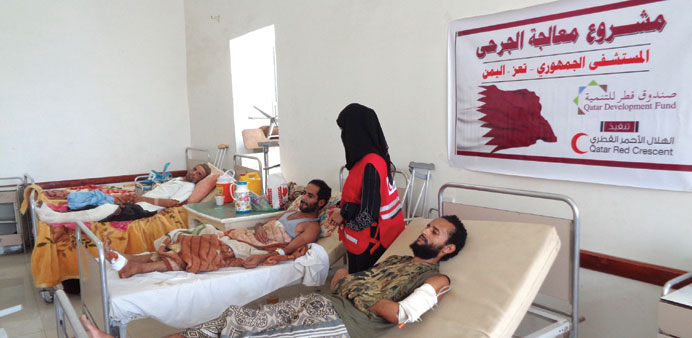QNA/Doha
For four months in a row, Qatar Red Crescent Society’s (QRCS) relief staff in Yemen have been helping the communities affected by the violence there.
A humanitarian programme is in place to relieve the Yemeni people over six months, with funding of more than $4mn (QR 14.5mn) from Qatar Development Fund.
QRCS’s staff are working on two levels: (1) providing aid in Yemen through the representative missions in Sana’a and Aden and (2) bringing relief to the Yemeni refugees in Djibouti, the nearest shelter to the conflict zones in Aden, Lahij, Taiz, and other governorates.
Last month, QRCS established an official mission in Djibouti to supervise these activities in co-ordination with government and non-government institutions, such as the Ministry of Interior, the Ministry of Health, the Ports Department, the Red Crescent Society of Djibouti, Sanabil Charitable Organisation, and the concerned international organisations.
In Aden, QRCS initiated a project to support hospitals with medical and surgical staff in orthopaedics, neurosurgery, plastic surgery, vascular surgery, and oral & maxillofacial surgery.
They have medical equipment and supplies to perform surgeries in 22 May Hospital.
Initially, 84 people will be covered in the first phase from Dhale, Lahij, and Abyan.
In Taiz, more than 600 injured people have undergone surgeries so far in Al-Joumhouri and Al-Safwa Hospitals.
To deal with the increasing numbers of victims, two more hospitals will be engaged in receiving the injured.
A recovery centre was established for the benefit of 1,500 post-surgery inmates. This included furnishing, maintenance, equipment, an ambulance, laboratory supplies, medical and technical staffing, catering, and staff incentives.
Another project is to support dialysis centres in Aden, Abyan, Lahij, Dhale, Taiz, Ibb, and Al-Hudaydah.
This included medical and nonmedical equipment, ACs, water tanks, maintenance, rehabilitation, fuel, water supply, and staff incentives in seven hospitals.
One project conducted by QRCS in Djibouti with funding from QDF is to move the injured from Yemen to receive treatment in Djibouti.
This project covered more than 60 patients who underwent surgeries in public and private hospitals, in co-ordination with the Djibouti Ministry of Health.
In Obock, a contract was signed with the Office of the United Nations High Commissioner for Refugees (UNHCR) to procure 300 shelter units for Yemeni refugee families.
The shelters are being transported by sea to Obock and will be installed next month.
Finally, QRCS will offer healthcare to 1,450 Yemeni refugees in Markazi refugee camp, as well as the population of the remote region, where health and other basic services are poor.
The nearest hospital is 4km away and is inadequate to meet the needs of the refugees and local community.

A QRCS staff memebr attending to Yemeni refugees in a hospital.
